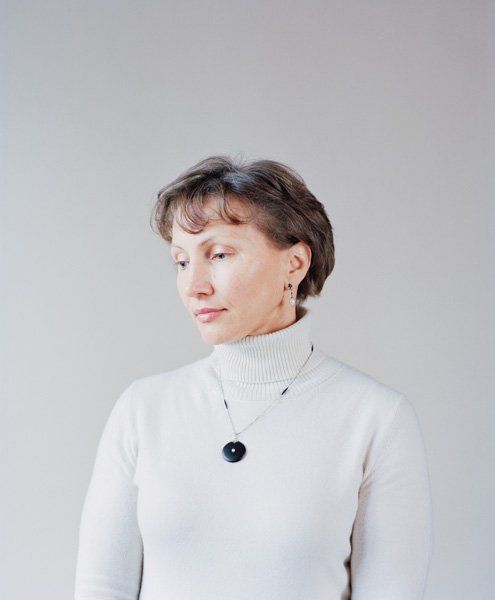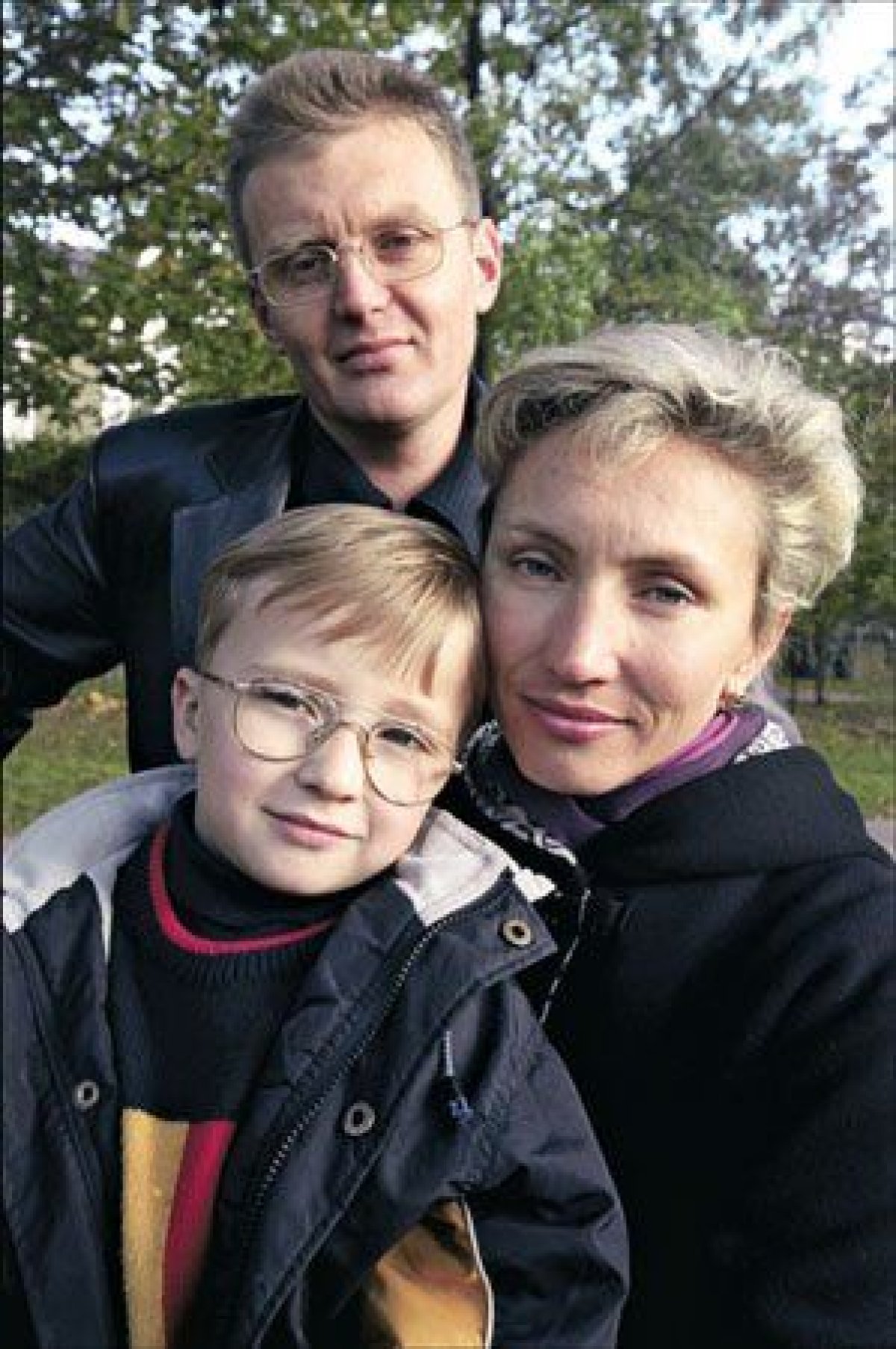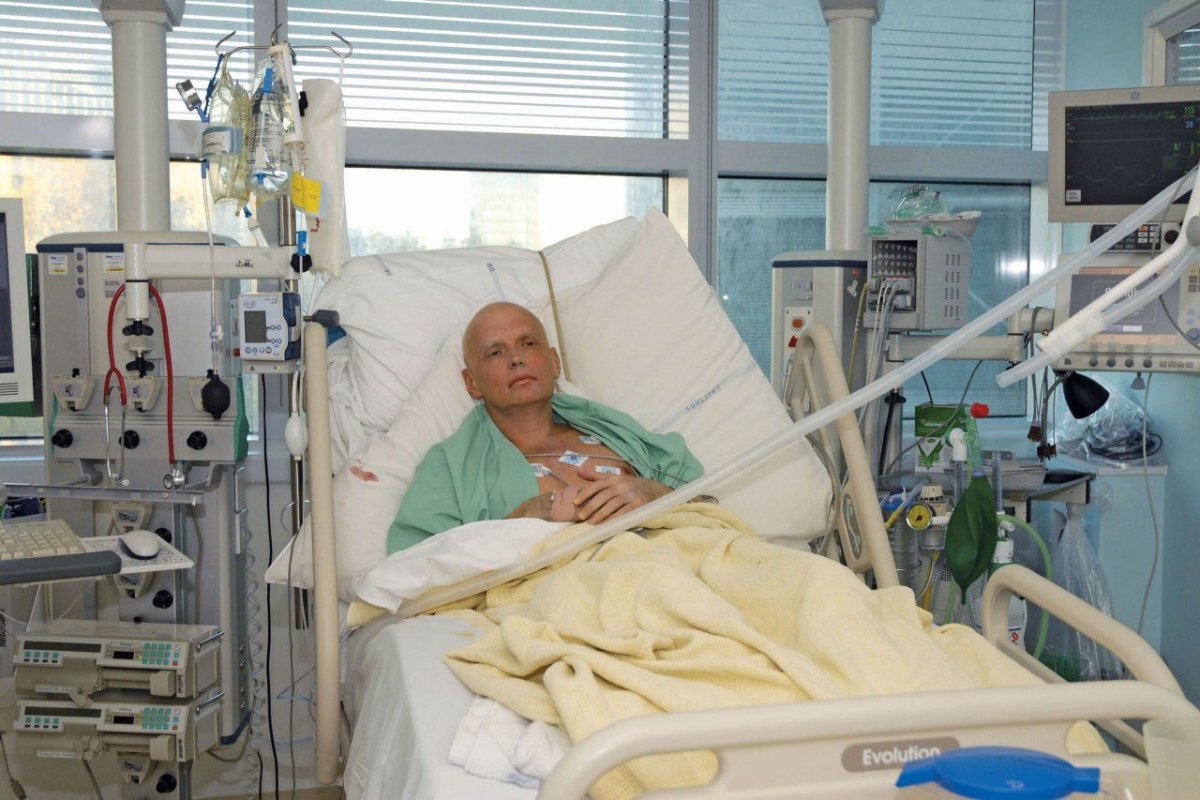
"My husband was murdered. I think the order came from Putin. And I want justice," says Marina Litvinenko. It's the last day before Christmas and outside the tapas bar we are sitting in, shoppers are hurrying through the London rain, laden with last-minute presents. In the year 2000, Marina and her husband, Alexander, a former KGB officer, sought political asylum in London, where he publicly went against his boss, Vladimir Putin, and accused the Russian FSB (the successor to the KGB) of blowing up apartment blocks and blaming it on Chechen terrorists, and controlling protection rackets and international drug rings.
"We thought we would be safe in Britain," says his widow.
On the evening of Nov. 1, 2006, Alexander came home and started vomiting, over and over. Marina scrubbed and washed up after him in the bathroom: "I was on my knees for three days, scrubbing. I just couldn't understand what was going on, he had never been sick before." Could Alexander have been poisoned?
"When the doctors came we tried to explain we were political dissidents, that this could be a hit.They looked at us like we were crazy."
As Alexander's hair began to fall out when Marina stroked it, as he became unable to open his mouth to talk, as he became yellow and shriveled, it became clear that he had been poisoned. But by what?
"They tested for everything. Every time they thought they had found the source—and an antidote. My heart would rise. But it would turn out to be the wrong diagnosis."
After three weeks, exasperated toxicology experts checked for polonium-210. The test was positive. Only tiny amounts of polonium-210 are produced each year, mainly by state-controlled nuclear reactors, 97 percent in Russia. It had almost been the perfect hit: Alexander should have died within three days, an unexplained death.
Fading fast, Alexander wrote an open letter to Putin, accusing his old boss of his murder. Marina was horrified: "I still hoped he would make it. How can you write a death letter when you might still live?"
The next day Alexander was dead. Scotland Yard easily followed the polonium trail: it had been slipped into a cup of tea Alexander had drunk during a meeting with another former KGB agent, Andrey Lugovoy, in the Millennium Hotel, Mayfair. Traces of polonium were found on Lugovoy's flight between Moscow and London. Lugovoy was now back in Russia: when Britain tried to extradite him, the Russians refused. Instead he was made into a member of Parliament—with immunity from prosecution. The case, and the evidence, was put on ice.
"For six years I wasn't ready to step forward. But if I don't act now this case will disappear and Putin will get away with it," says Marina.
She has initiated a public inquest, and plans to take the Kremlin to the European courts.
"I want all the evidence to be made public. I want the people who masterminded the murder. I don't think Putin is sleeping easily." Marina smiles. She has clear, cornflower-blue eyes, and for all the talk of mafia and murder, seems to shine with cheer and poise.
"You have to accept the life you're given," she tells me. "We tend to overblow our problems. Some things you can't change—like the rain outside."
"How do you keep yourself so positive?"
"Dancing," she says. "I'm a professional ballroom dancer. It gives you an inner freedom."
Marina Litvinenko is the most unlikely person to have ended up taking on Vladimir Putin. Until the age of 30 she knew of the KGB only from swashbuckling Soviet films about noble spies, had never heard of dissidents. Growing up in the late Soviet Union, Marina inhabited the other Russia, not the Russia of Kremlin intrigue and gulags and torture but the private country most Russians do their best to dwell in. A world of romcoms and cheery children's songs, where extended family connections replace the state and television shows of endless ballet, figure-skating, and waltzes. "I had a choice at university between economics and dancing. I could sense the Soviet system was fake, so I chose dancing. I danced 24/7." Marina made it right to the top: in 1990 she and her partner were one of six finalists in the all-Soviet ballroom-dancing championships.
"My strength was waltz and tango. The dances where you have to feel your partner, move in tandem."
In 1993, on her 31st birthday, Marina met Alexander.

Alexander was from the other Russia. An officer in the organized crime and antiterrorism department of the former KGB. Mutual friends brought him along to her birthday party—Alexander had helped them by rounding up a protection racket that had attacked their small business. Marina had never met anyone from the "services" before: he had never met a dancer.
"I just saw this unkempt, unloved boy. He had gaps in his teeth: no one had even explained to him he was meant to put in new ones."
"The boy" specialized in kidnappings, extracting information from suspected terrorists, and, in a case he would later feel bad about, tampering with video evidence of human-rights abuses in Chechnya. But Marina's almost maternal instincts were not unfounded. Alexander had barely known his parents, was raised by grandparents, and committed himself to the KGB like one looking for a home ("Orphans," M tells James in the latest Bond movie, "make the best recruits").
Marina interweaves the fingers on her two hands and moves them in a wavelike motion: "We were a perfect tandem: where he was tough I was smooth."
The dancer and the KGB hard man were married within a year. They had a son. Marina put on lambada numbers for pop stars, Alexander faced down corrupt cops in armed standoffs on the street. But with every year Alexander would look increasingly tired and angry when he returned to their two-room apartment after work. When Marina would ask what was wrong he would shrug and tell her, "There are some things it's better for you not to know."
"Didn't you mind being in the dark?" I ask her.
"He was always perfect in his duties as a husband and a father. He had his role, I mine. As a dancer you learn to move to the music, attune yourself, like a violin."
Occasionally Alexander would bark: "It's becoming impossible to live here."
"Why impossible?" Marina would answer. "Look at our lovely friends, our family."
"You don't understand. Crime is taking over everything. It goes right to the top."
Marina would push his words away. "Most Russians live in a glass world where they pretend there are no bad things, that's where we all try to exist, until someone throws a stone and breaks it."
The first stone was cast in 1998, when Alexander gave an interview to the country's top journalist about what was really going on at the FSB.
"I stood by the side of the camera unit as he gave the interview, and suddenly I saw the world from his perspective."
For the past year Alexander had been assigned to a clandestine unit in the FSB set up to kill terrorists and mafia bosses undercover: like many tough investigators, Alexander thought the law a hindrance to getting bad guys. But it turned out the unit wasn't focused on catching criminals. Instead, Alexander now told the flabbergasted reporter, he had been told to "take care" of an FSB whistleblower who had uncovered how Russian generals were selling plane-loads of weapons to terrorists; arranging the kidnap and ransom of the brother of a billionaire hotelier; and attempting to assassinate the country's most influential oligarch, Boris Berezovsky.
"It all came together," says Marina. "Alexander had joined the services because he wanted to be one of the good guys. He needed a mission, to see things in black and white. Now he was going against the system. But I still believed in justice, that his going public would clear up the corruption."
At first it seemed Alexander's gamble had paid off. Partly thanks to him, the head of the FSB was sacked. A new man was brought in. He was thought to be an ally of the country's reformers. His name was Vladimir Putin. Alexander came to see Putin with a huge flow chart he had drawn up detailing the connections between the FSB and organized crime. When he came back home after the meeting he wasn't impressed.
"This new guy's not right," Alexander told Marina that night, "he has a limp handshake, he doesn't look me in the eye. He's so paranoid he's brought his own driver from St. Petersburg. He's not interested in clearing up corruption."
That same evening the Litvinenkos' phone was bugged.
"Alexander was the first person to say Putin was a bad one," Marina tells me. "Now everyone can see it, but back then no one believed him. But that was the thing about Alexander. Everything he predicted came true. He told me 'now they will either arrest or kill me.' I didn't want to believe him."

Marina was teaching an aerobics class when Alexander's colleagues came to tell her he had been arrested. Over the next year, charge after charge was brought against him. As soon as one was dismissed in court, another was brought.
"He shouldn't have gone public," the prosecutor told Marina when she confronted him. "We'll find some way of getting him."
Marina had to learn a new dance: that of the prisoner's wife.
"I switched on a self-defense mechanism. I focused on everyday survival. I cooked food to bring to Alexander. Told our son tales that Daddy had gone away on business. The little things: that's how a woman in my situation survives."
In 2000, in a break between sentences, Alexander told Marina they were going to make a run for it. At first she couldn't believe it.
"Up until then I thought we would muddle through. I just couldn't imagine a world different to the one I'd known. I still clung on to my glass world."
They couldn't tell anyone they were running. Marina only called her mother once they had been given asylum in London to say she would never be able to return.
The Litvinenkos began a new life. The British government gave them a new name: the Carters. Alexander began to spend time with Russian exiles like the Yoda of the Soviet dissident movement, Vladimir Bukovsky.
"His worldview grew," remembers Marina, "he realized what he'd seen in the 1990s was part of a larger pattern going back to Stalin's KGB."
Supported by the oligarch-turned-Putin-opponent Berezovsky, whose life he had saved, Alexander now went full tilt against the "service" that had created him. He claimed that the FSB supervises the transport of drugs from Afghanistan to Western Europe; that they train terrorists from across the world, including al Qaeda's Ayman al-Zawahiri, who, according to Litvinenko, spent six months in an FSB training camp; that they were responsible for "Chechen" terror acts from blowing up Moscow apartment blocks to taking a Moscow theater hostage. Litvinenko's evidence was circumstantial and dismissed even by many critics of Putin. His main argument was that Putin was creating a hybrid KGB-mafia system. During the early 2000s, the idea was unfashionable: Putin was still celebrated in the West as a strong leader and an ally in the war on terror.
Unlike in Russia, Alexander could now share all his thoughts with Marina: "He would wake me in the middle of the night, asking for advice on articles," she says proudly. When the reality show Strictly Come Dancing appeared on TV, ballroom came back into fashion and Marina began teaching again. Compared with Moscow, the family would spend more time together.
But gradually Alexander began to grow alarmed.
"When rich Russians began to buy up whole chunks of London he feared the KGB were starting to infiltrate Britain. He thought the British naive. No one knew where the money was coming from, who was really behind the Russian investors in British companies. He could see how Putin was spreading his power westward, making Europe dependent on Russian energy and dirty cash. The world we had run away from was starting to come here."
The tapas bar we are sitting in is in Kensington, near the heart of Russian London. In next-door Belgravia, home to some of the most expensive property in the world, the huge stucco mansions stay empty and dark even through Christmas, waiting for their Russian oligarch owners who sweep in on a rare occasion with their retinues.
"By 2006 I could see the old investigator's look in Alexander's eye," says Marina.
"He told me he was helping both MI6 and the Spanish secret services to investigate the connection between Russian mafia money laundered in Europe and the Kremlin. I don't believe he was just killed out of revenge. I think it was the new work he was doing, investigating the growth of the mafia-state in the West."
After Alexander's death, his hospital photo and "J'accuse" to Putin made the front pages across the world. When traces of polonium were discovered across London, the capital was put on radiation alert: it looked like the Russians had essentially launched a tiny nuclear attack on the U.K. The dark world of the modern KGB had burst into the civilized streets of central London. There was outrage and talk of a "new Cold War." The Foreign Office told Marina the moment Lugovoy stepped outside Russia they would arrest him. Marina put her faith in the system and focused on bringing up their son.
"He was 12 when Alexander was killed. Looking after him kept me together. We talk about Alexander every day, but I would try not to think too much about his murder. I was never a spokesperson. That was never my role. And I hate this sort of publicity: a dance of death."
But as Marina retreated into her private life, stories began to circulate: could Alexander have been trafficking nuclear weapons and accidentally poisoned himself? Could Berezovsky have killed him to put a black mark on Putin? Meanwhile Putin waxed stronger. President Obama launched his "reset" with Russia. The EU became even more dependent on Russian energy. In 2010 a Spanish prosecutor investigating money laundering in Spain announced Russia a "virtual mafia state"—but that hasn't stopped more Russian billions from pouring into a bankrupt Britain with no questions asked about where the money comes from.
"When I saw Cameron shaking hands on TV with Putin in 2011, talking about rebuilding Russian-British relations, I realized I couldn't wait any longer," says Marina.
With Berezovsky in financial trouble, she is on her own, appealing to the public to raise funds for lawyers. The inquest has already silenced the more slanderous stories about Alexander, counsel announcing there is prima facie evidence for the "culpability of the Russian state" in the death. The same day a London Times editorial insisted: "The inquest must not sour relations with Moscow ... Britain is the biggest overseas investor in Russia."
Marina smiles: "The British think that by being nice to Putin he will be nice back. Alexander tried to explain to them—if you give an inch, the KGB just think it's a sign of weakness. But the British want to believe in their little glass world—just the way I did."
Outside the café, the shops are closing before Christmas. Our tapas bar is filling up with smiling, flushed shoppers, eager for coffee. We have to drop our voices.
"Do you ever regret he went against the system? You could have stayed in your world?"
Marina shakes her head. "He would tell me he could only step forward because he knew he had my love to back him up." She glows when she says this. "Now it's my turn to lead." The choreography of a couple working in partnership, in a perfect dance, trumps fear and regret for her. This is a love story.
Peter Pomerantsev is a television producer and nonfiction writer. He lives in London.
Uncommon Knowledge
Newsweek is committed to challenging conventional wisdom and finding connections in the search for common ground.
Newsweek is committed to challenging conventional wisdom and finding connections in the search for common ground.
About the writer
To read how Newsweek uses AI as a newsroom tool, Click here.








